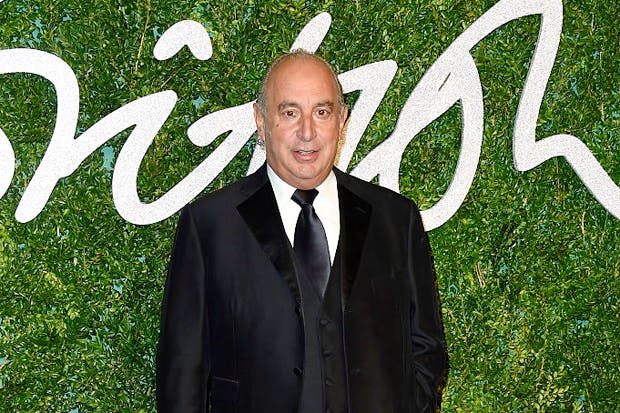Not even your quixotic columnist is prepared to mount a full-on defence of Sir Philip Green this week, following the publication of the joint select committees’ report on the sale and collapse of BHS, and committee chairman Frank Field MP’s description of Green himself as ‘much worse’ than Robert Maxwell. What I would say, however, is that if you’re really interested in this story, read the actual report — rather than the knockabout précis of it in the Daily Mail, which has renamed Green ‘Sir Shifty’ — and form your own judgment, both of the extent of Green’s culpability in the loss of 11,000 BHS jobs and the devastation of its pension funds, and of the fairness of the MPs’ exposition and conclusions.
You might, I suggest, find their analysis of Green’s unwillingness to continue pouring investment into the declining BHS brand a tad superficial, or even wholly lacking in understanding of the retail science in which Green was once an acknowledged master. But you will probably agree with the MPs that his sale of the store chain to a consortium led by former bankrupt Dominic Chappell, who had no money or retail experience behind him, was a cynical outrage.
The deal seems to have happened only because Green himself was prepared to waive the conditions he set for finding a reputable new owner for BHS, and to deploy all his financial ingenuity to keep the out-of-his-depth chancer Chappell in play. A gallery of professional advisers (including the lawyers Olswang and accountants Grant Thornton for Chappell’s group) were content to collect fat fees while claiming each others’ presence made the whole shemozzle respectable. In hindsight it’s hard to understand how anyone involved thought Chappell capable of saving the sinking BHS ship, and indeed he wasn’t. But by the time the business finally went down with all hands, the Green family must have thought they had left responsibility for it behind them.
Then there’s the problem of the BHS pension funds, which had fallen into deficits of £233 million by 2012. Green blames the funds’ trustees for bad decisions and their regulators for being too bureaucratic, but the truth is that his best offer as the employer, of an annual contribution of £10 million for three years, was a minimal gesture which could only have restored the funds if sustained over many years in favourable markets. Green did not create the pension-fund ‘black hole’; in particular, though the MPs strain to make this connection, he did not create it by taking huge dividends out of BHS (in his wife’s name as the ultimate owner) in the years when the company was profitable and the funds were in surplus. But he was callous and mean in his attitude towards resolving it — and that perceived moral failing will now cost him either a very large cash contribution to quell the clamour, or his knighthood, or both.
Would that be a fair outcome of a fair process? Yes, in the sense that the extreme distribution of rewards and losses from BHS since Green bought the business in 2000 is a grotesque stain on capitalism, and an injection from the Greens’ fortune into the pension funds is all that can now be done to reduce the damage. And yes, Green will have a lot less tabloid trouble in future if he forfeits his title. But still the MPs’ report reads like a witch hunt, and Frank Field’s undisguised personal animus towards Green amplifies that impression: we are watching a rough-diamond dealmaker being brought down by a very rough form of justice.
The unicorn hunt
After the sale of the UK’s leading microchip maker Arm Holdings to Japan last week, I invited you to name the next generation of British unicorns — high-tech start-ups that will be worth a billion dollars by the middle of the next decade. When I ask this sort of question, I’m conscious of the danger that the most glowing testimonial may come from the proud mother (or disguised PR man) of the entrepreneur concerned. But here, from a bulging postbag, are four that sound genuinely promising.
IQE, headquartered in Cardiff, is a semiconductor maker that has expanded to the US and Singapore and could well be the next Arm. Owlstone Nanotech, at Cambridge Science Park, makes miniaturised detectors for chemicals, toxins, explosives and medical applications. Oxis Energy, at Culham near Oxford, is using lithium sulphur chemistry to create new-generation batteries with high ‘energy density’ (energy per unit of weight) for electric vehicles, household energy storage and military equipment. And in the ‘fintech’ field which is reckoned our strongest suit these days, Revolut, in Canary Wharf, is a low-cost debit card, currency exchange and payment app, founded by a former City trader, that is rapidly attracting customers. If I’m still here in 2026, remind me to check if they hit the billion mark. More suggestions please, to martin@spectator.co.uk.
The ministry of posh
Apart from Boris, where have all the posh boys (and girls) gone in Theresa May’s government? The answer, curiously, is the new department for Business, Energy and Industrial Strategy. Secretary of state Greg Clark is impeccably classless, being the product of a Roman Catholic secondary school in Middles-brough where his father and grandfather were milkmen. But his ministerial team consists of three Old Etonians — Nick Hurd, Jo Johnson and Jesse Norman — plus Margot James (Millfield) and convent girl Baroness Neville-Rolfe.
Reassuringly, however, all five have business experience — and more so than Clark himself, who has quietly climbed the greasy pole as an all-purpose policy wonk. Ex-civil-servant Lucy Neville-Rolfe knows all there is to know about consumer trends, having been an executive director of Tesco, a non-executive director of ITV and chairman of Dobbie’s Garden Centres. Jesse Norman used to work alongside me at Barclays long ago: if he knuckles down to his junior brief, quells his inclination to rebel and bins the OE tie, he’s my tip for quick promotion.
Got something to add? Join the discussion and comment below.
Get 10 issues for just $10
Subscribe to The Spectator Australia today for the next 10 magazine issues, plus full online access, for just $10.















Comments
Don't miss out
Join the conversation with other Spectator Australia readers. Subscribe to leave a comment.
SUBSCRIBEAlready a subscriber? Log in